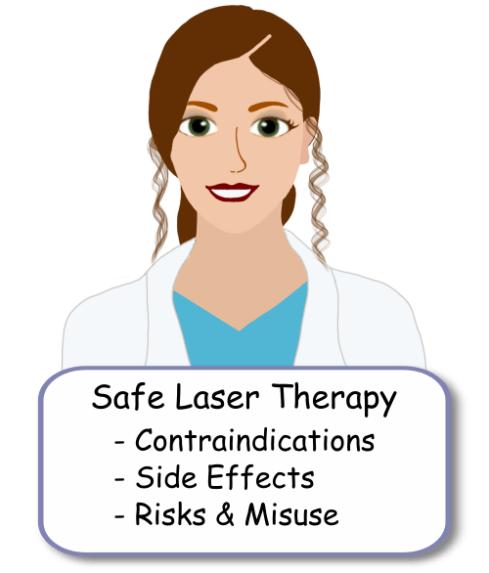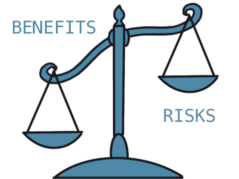Ensuring
Safe Laser Therapy
Treatment
Laser therapy (PhotoBioModulation) is a safe procedure when applied by a qualified health practitioner. They should be fully trained in the following safety topics:

LASER THERAPY | Update: 20/10/2020
1- Factors potentially generating heat with laser therapy
Heat is not always perceived during a laser therapy treatment and it is not part of the PhotoBioModulation process. It is a complementary beneficial effect for cases such as muscle spasms, joint pain, and before stretching and rehabilitation care.
The heat perception is related to:
- Power density in W/cm2.
- Speed of scanning motion (Class IV lasers / High Intensity lasers) vs fixed points (Class IIIb lasers / cold lasers).
- Quantity of melanin pigment in the patient's skin.
- Laser output frequency: pulsing or continuous wave.
- Presence of external chromophores such as tattoo pigments.
- Patients taking photosensitizing drugs.
- Distance to the skin.
Please note that laser therapy devices are organised into classes according to the potential eye and skin injury hazards:
- Class 3b: Defines low power lasers with average power lower than 0.5W.
- Class 4: Defines lasers with average power higher than 0.5W.
Both Class 3b and class 4 therapeutic lasers are safe when performed with their appropriate delivery mode:
- Class 3b: Fixed points.
- Class 4: Scanning motion over large area.
Laser Therapy Contraindications Checklist
Laser Therapy
Absolute Contraindications
- Pregnancy
- Active Cancer
- Eye
- Thyroid
- Electronic Implants
- Active Bleeding
Laser Therapy
Relative Contraindications
- Epilepsy
- Tattoo
- Infection
- Topical Applications
- Steroid injection in the joint
- Photosenzitating drug
Laser Therapy
Potential
Side Effects
- Mild warmth sensation with high average power setting
- Bruising from pressure of the probe
- Heat sensitive tissue (Brain, Teeth, Growth plates)
- Temporary discomfort post-laser
2- Absolute Contraindications For Safe Laser Therapy
Laser Therapy absolute contraindications refer to situations when laser therapy should not be used under any circumstances.
Eyes
This is the major absolute contraindication.
With the lens acting as a magnifying glass, eyes are prone to get injured by Class 3b and Class 4 therapeutic lasers. The laser beam should NEVER be directed toward the eyes or eye damage could occur. Direct beam is also a danger when wearing protective laser goggles.
Pregnancy
To this date, no studies have confirmed laser therapy to be safe on fetal tissues and pregnant woman.
Therefore, as a preventative measure the official recommendations is to not use laser therapy treatment during pregnancy.
Electronic Implants
Laser units could interfere with electronic implants such as pacemaker and spinal cord stimulators. It may not be safe to use this technology on patients with these implants.
Please note that surgical implants such as wires, plates, and screws are NOT a contraindication.
Active Bleeding
One of the cellular effects of photobiomodulaiton is local vasodilation.
Therefore it is advised to avoid bleeding areas or recent traumas, until coagulation is under control.
Thyroid
Laser therapy could potentially increase the activity of this glandular tissue.
Official recommendations are to avoid direct thyroid exposure in order to avoid a potential thyroid storm.
Cancer (Neoplasma)
Laser therapy uses red and near-infrared wavelengths. These wavelengths are non-ionising radiations. Therefore, laser therapy is considered safe. Non-ionising radiations do not trigger cumulative DNA cellular damages (leading to cancer).
Lately recent publications discuss the benefits of PhotoBioModulation to the immune system to control malignant cells. However it is not yet considered safe to use laser therapy on patients with active cancer lesions.
3- Relative Contraindications For Safe Laser Therapy

Laser Therapy relative contraindications refer to situations where laser therapy should be used with care under specific conditions.
Tattoo
Pigments from a tattoo can potentially absorb and focus the laser beam on the surface of the skin. In other words, heat could build up at the surface and prevent the laser beam from penetrating to deeper tissues. Skin pigment melanin or pigments from tattoo affect the dosage in deep tissues.
Please note that laser tattoo removal technology is different than laser therapy / PhotoBioModulation.
Infections
One of the cellular effects of photobiomodulation is the increase of cellular metabolism and the production of growth factors.
Therefore, there is a potential risk of bacterial proliferation when exposed to laser therapy.
As long as the infection is under control with debridement and antibiotic, it is considered safe to use laser therapy in order to promote tissue and wound healing.
Topical Applications
Any products on the skin has the potential to interfere with the photons as an external chromophore.
For example, betadine solutions, sunscreen, make up and others skin products could interfere with the penetration of the laser beam.
Safe laser therapy procedure recommend to always clean skin or wounds with saline before treatment.
Photosensitizing Drugs
Many oral drugs are photosensitizing. This means that the patient's skin can become more sensitive to light than usual.
Therefore the patient is more prone to develop erythema and irritation post laser treatment.
Please check the patient history to ensure a safe laser therapy treatment.
The most common photosensitizing drugs are:
- Roacutan / Isotretinoin (6 months)
- Doxycycline (4 weeks)
- Trimethoprim Sulfonamide
- Antifungus
Each drug requires a different waiting time before a safe laser therapy treatment can be ensured. When unsure please proceed with a skin patch test.
Epileptic Patient
Infrared radiations are not known to trigger epileptic seizures.
However, please remember that the laser beam can be emitted in pulsing mode which can create a repetitive light and sound (beep) pattern.
This pattern like other stroboscopic light can initiate an epileptic response.
Safe laser therapy session is possible with stable epileptic patients. When possible, switch off the sound of the device and cover the laser handpiece to decrease visual and auditive stimuli.
Injectable Drugs
Some injectable drugs could potentially interfere with laser therapy.
Injections in subcutaneous, Intravenous and intramuscular layers are rapidly absorbed within minutes. They are unlikely to receive laser exposure during this period.
However, a potential issue could arise with corticosteroids injections in joints. Injected medication remains longer in a joint and could react with the laser beam. Please delay for 7 -10 days any laser treatment over a joint post-injection.
Steam cells and PRP treatments are NOT contraindicated.
4- Potential Side Effects
Laser Therapy side effects refer to the potential additional effects other than the expected effect.
Bruising
Laser therapy is safe when applied in contact and non-contact mode.
Please be cautious with elderly patients as some may develop mild bruising from the pressure of the probe in contact with the skin if on-contact mode is used. Non-contact mode is preferable.
Discomfort
Adverse reactions are rare with laser therapy.
However, they may include:
- Temporary increase in pain the day after the treatment
- Some tingling, pins and needles may be temporarily felt in the treatment area.
Sensation Of Warmth
When using a high power therapy laser (>5W avg) a sensation of warmth can be felt by the patient during treatment.
As discussed above it is a beneficial additional effect for many MSK applications.
Here is an example of a Laser Therapy session in the Medical field.
Here is an example of a Laser Therapy session in the Veterinary field.
Heat sensitive areas
Some areas such as teeth, brain and growth plates are temperature sensitive.
Laser therapy is safe and commonly used:
- With children.
- On teeth by dentists.
- For transcranial applications on the brain tissue.
However, when heat sensitive areas are treated with a Class 4 therapeutic laser it is important to use the preset program with the appropriate dosage. Please pay attention to the speed of the scanning motion to maintain a gentle warmth.
For the same reason, it is not considered safe to use laser therapy on non-united fontanelles of young children and infants.
5- Misuse Of Class 4 Therapy Lasers
If used by a negligent or untrained practitioner a high power Class 4 laser configured at its maximum capability could potentially involve adverse effects.
K-Laser Class 4 therapy lasers are designed exclusively to be used by trained health professionals.
Thanks to the appropriate training of the practitioners, our advanced laser technology, and a user friendly software which calculates optimal dosage to prevent mistakes, involuntary misuse is very unlikely to happen.
K-Laser Australia training always includes:
- Full laser safety training based on AU / NZ standards
- Training on how to use the K-Laser software
- Training on how to implement recent publications to a K-Laser
- Clinical protocols
Contact Us
Discuss Your Needs
Request Demonstration
Consider Your Options
Get A Price



